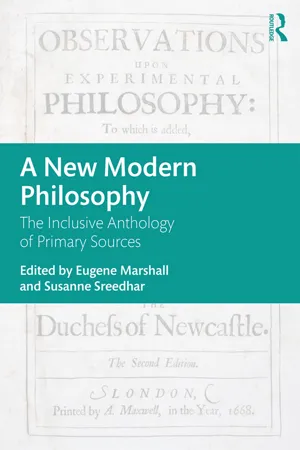
A New Modern Philosophy
The Inclusive Anthology of Primary Sources
Eugene Marshall, Susanne Sreedhar, Eugene Marshall, Susanne Sreedhar
- 728 pages
- English
- ePUB (mobile friendly)
- Available on iOS & Android
A New Modern Philosophy
The Inclusive Anthology of Primary Sources
Eugene Marshall, Susanne Sreedhar, Eugene Marshall, Susanne Sreedhar
About This Book
The seventeenth and eighteenth centuries are arguably the most important period in philosophy's history, given that they set a new and broad foundation for subsequent philosophical thought. Over the last decade, however, discontent among instructors has grown with coursebooks' unwavering focus on the era's seven most well-known philosophers—all of them white and male—and on their exclusively metaphysical and epistemological concerns. While few dispute the centrality of these figures and the questions they raised, the modern era also included essential contributions from women—like Margaret Cavendish, Elisabeth of Bohemia, Mary Wollstonecraft, and Émilie Du Châtelet—as well as important non-white thinkers, such as Anton Wilhelm Amo, Julien Raimond, and Ottobah Cugoano. At the same time, there has been increasing recognition that moral and political philosophy, philosophy of the natural world, and philosophy of race—also vibrant areas of the seventeenth and eighteenth centuries—need to be better integrated with the standard coverage of metaphysics and epistemology.
A New Modern Philosophy: The Inclusive Anthology of Primary Sources addresses—in one volume—these valid criticisms. Weaving together multiple voices and all of the era's vibrant areas of debate, this volume sets a new agenda for studying modern philosophy. It includes a wide range of readings from 34 thinkers, integrating essential works from all of the canonical writers along with the previously neglected philosophers. Arranged chronologically, editors Eugene Marshall and Susanne Sreedhar provide an introduction for each author that sets the thinker in his or her time period as well as in the longer debates to which the thinker contributed. Study questions and suggestions for further reading conclude each chapter. At the end of the volume, in addition to a comprehensive subject index, the book includes 13 Syllabus Modules, which will help instructors use the book to easily set up different topically structured courses, such as "The Citizen and the State, " "Mind and Matter, " "Education, " "Theories of Perception, " or "Metaphysics of Causation."
And an eresource offers a wide range of supplemental online resources, including essay assignments, exams, quizzes, student handouts, reading questions, and scholarly articles on teaching the history of philosophy.
Frequently asked questions
Information
Table of contents
- Cover
- Half Title
- Title Page
- Copyright Page
- Table of Contents
- Editors’ Introduction
- Acknowledgments
- Bibliography of Sources
- 1 Michel de Montaigne
- 2 Francis Bacon
- 3 Thomas Hobbes
- 4 René Descartes
- 5 Margaret Cavendish
- 6 Blaise Pascal
- 7 Robert Boyle
- 8 Anne Conway
- 9 John Locke
- 10 Baruch Spinoza
- 11 Nicolas Malebranche
- 12 Isaac Newton
- 13 Gottfried Leibniz
- 14 Damaris Cudworth Masham
- 15 Mary Astell
- 16 Bernard Mandeville
- 17 George Berkeley
- 18 Charles-Louis de Secondat, Baron de la Brède et de Montesquieu
- 19 Joseph Butler
- 20 Anton Wilhelm Amo
- 21 Émilie du Châtelet
- 22 Thomas Reid
- 23 David Hume
- 24 Jean-Jacques Rousseau
- 25 Edmund Burke
- 26 Immanuel Kant
- 27 Thomas Paine
- 28 Marie Jean Antoine Nicolas de Caritat, Marquis de Condorcet
- 29 Julien Raimond
- 30 Olympe de Gouges
- 31 Ottobah Cugoano
- 32 Mary Wollstonecraft
- 33 Declaration of the Rights of Man and of the Citizen
- 34 Sample Syllabus Modules
- Index